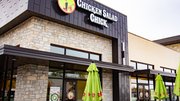News
Americans weigh in on safety of artificial sweeteners
June 26, 2008
ROCHESTER, N.Y. — Does the type of artificial sweetener really matter to consumers? Harris Interactive has announced the results of a survey that shows that Americans are split on the importance of knowing what sweeteners are used. And a majority do believe artificial sweeteners are only somewhat or not at all safe.
Harris surveyed 2,602 U.S. adults online between May 5 and 12, 2008. The results show that:
- Half of Americans (50 percent) say it is extremely or very important to know what sweeteners are used when they are purchasing food and beverages while half (50 percent) say it is only somewhat or not at all important. Just under one-quarter of U.S. adults (22 percent) believe it is extremely important to know this information;
- Three in five Americans (61 percent) believe artificial sweeteners are only somewhat or not at all safe while one in five (21 percent) say they are extremely or very safe and just under one in five (18 percent) are not at all sure about the safety of these sweeteners.
While Americans may not believe these artificial sweeteners are completely safe, there is no level of concern over them at the moment:
- Just one quarter of Americans (23 percent) say they are extremely or very concerned about the amount of artificial sweeteners they and their family consume, with just one in 10 (9 percent) extremely concerned;
- More than three-quarters (77 percent) are only somewhat or not at all concerned about the amount of artificial sweeteners consumed, with more than one-third (36 percent) not at all concerned.
There is a generational difference on attitudes towards artificial sweeteners. Specifically:
- The older generations are more likely to want to know what is sweetening their food. Three in five (59 percent) Matures (those aged 63 and older) say it is extremely or very important to know versus two-thirds (65 percent) of Echo Boomers (those aged 18-31) who say it is somewhat or not at all important to know what is sweetening their food;
- Matures also are most likely to believe artificial sweeteners are safe. Three in 10 (29 percent) of the oldest generation believe they are extremely or very safe compared to one in five (22 percent) Baby Boomers (those aged 44-62), 20 percent of Generation X (those aged 32-43) and just 13 percent of Echo Boomers.
As more information about the different artificial sweeteners comes out, people may start to become more concerned, and there might be some shift in those numbers.
Fulldata tables and methodologyfor this study can be found atwww.harrisinteractive.com.
Related Media
Food & BeveragePresented ByOracle
Presented ByOracle
 ChatGPT
ChatGPT Grok
Grok Perplexity
Perplexity Claude
Claude












